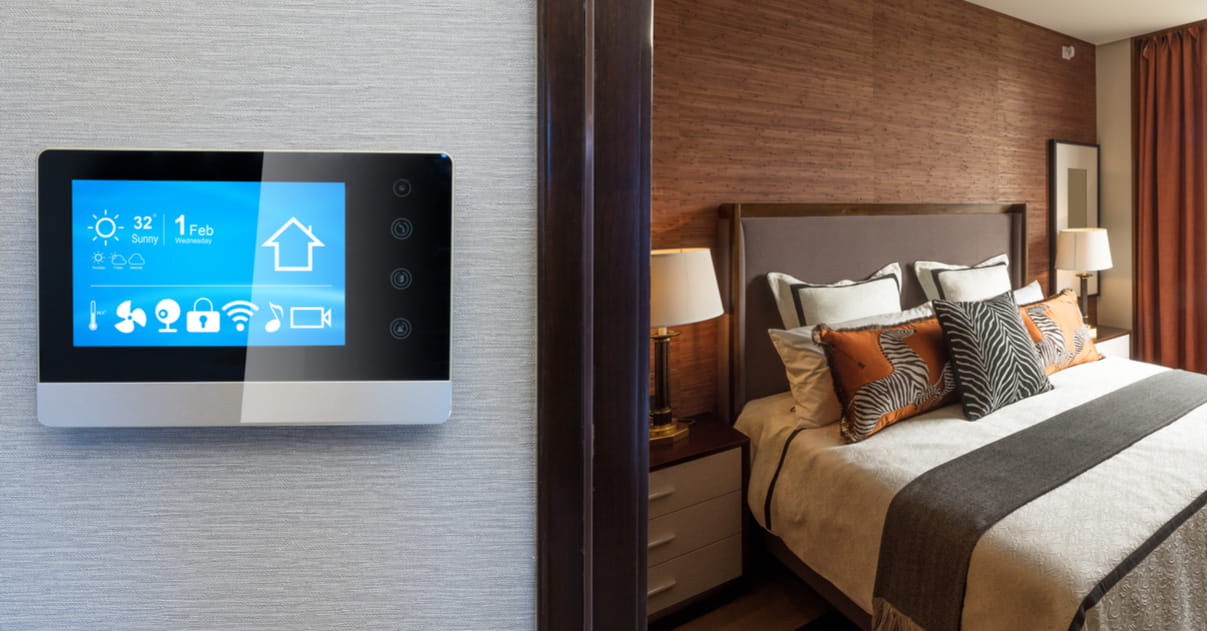Technology and the Hospitality Industry: What's Coming Up?

Technology continues to revolutionise every industry in the modern economy, so it’s no surprise that there are some major changes to the hospitality industry coming up.
General trends
There are some broad general trends which are defining the technological direction of the hospitality industry. These wider movements reflect the changes to the general business landscape and also the shifting desires of our customer base. Three key important shifts for the future of the hospitality industry are:
Mobility
The relentless development of increasingly mobile technology, primarily seen in the increased sophistication and capabilities of smartphones, demonstrates the shift towards more mobile facilities.
For example, a study by Cornell’s Center for Hospitality Research, Cross-Country Differences in Hotel Guest Satisfaction, showed that for guests from the U.S. even a five-minute wait led to a 47 percent decrease in customer satisfaction. Customers were found to increasingly choose mobile check in and check out on their phones rather than waiting in queues at reception.

The move towards mobile is not just beneficial for customers however. Utilising mobile technology allows hospitality businesses to run more efficiently and boost overall staff productivity. By giving staff portable devices and access to systems on the move, you can optimise workflow and give force greater freedom to do their job well.
Personalisation
The ability to discern useful customer information from big data is begging to revolutionise customer service and expectations. With the help of increasingly sophisticated data processing and utilising developments like AI and machine learning companies can now personalise online and real-life experiences to delight their customers.
In an industry that exists to create an ideal atmosphere for its guests, the hospitality sector is likely to move increasingly towards harnessing data to create a personalised experience. In fact, a study by MCD Partners showed that 74 per cent of travelers would allow hotels to use their personal data to make their stay better. Imagine being able to provide a guest with the room type they preferred, dietary requirements and even the right brand of complimentary tea bags, all without asking.
The increased prevalence of smart devices also give the potential for much more individual control of a hotel room environment. For example determining room temperature, electricity use or even downloading their preferred wall art for digital photo frames.
Social media
Technology has expanded into almost all areas of life, predominantly the ever present social media. Sites such as Facebook, Trip Advisor and Twitter are becoming as influential in the hospitality industry as traditional advertising and website listings. For example many people now look for hotel or restaurant recommendations via their friends on Facebook or through popular listed options on Trip Advisor.
It will become increasingly necessary for hospitality industries to keep tabs on their social media presence and even work on good strategic social media strategies to make sure they are appealing to the right audiences and people are actually finding them.
3 exciting and evolving technologies
So with the general trends covered, what specific new technologies are likely to hit the hospitality industry in the coming year, and how will they impact the everyday guest experience?
1. Voice assistants
Already a key part of industries such as banking, the addition of voice assistants seems likely to be a demand in most customer service industries in the near future. Voice assistants or chatbots are computer programs that use a variety of technologies to simulate human conversation in either message form or as a voice interface.
Breakthroughs in machine learning, natural language processing and voice recognition software mean that many businesses are already creating effective chat experiences for their customers. Not only is this a seamless and intuitive way for customers to ask questions and receive intelligent answers, it can also be particularly useful as a hands free option for older guests or those with disabilities.
It is unlikely and undesirable for human staff to be replaced in the hospitality industry. Instead voice assistants can manage mundane tasks such as room service food orders or simple check in questions.
2. Augmented reality
Arguably the little brother of the more often discussed virtual reality, augmented reality has many potential real world benefits. In it’s essence, augmented reality is an integration of digital information with the real world. Unlike VR which creates a totally artificial environment, AR takes the real world and overlays it with new information. The most successful example of this so far has been the game Pokemon Go where players can locate Pokemon in the game world by interacting with the real environment.
While it has yet to be employed in mainstream businesses, this technology holds some interesting possibilities for the hospitality industry in the near future. For example AR signage could help direct customers to the specific locations that they need on site, such as pick up points or rooms. Fun features such as interactive games set in your restaurant or hotel can also be a great way to appeal to a wide audience.

3. Smart keys and biometric authentication
Key cards were the first move away from the bog standard door key, but the future holds even more exciting developments for this aspect of hotel life. New app development means that customers can now simply download their door key and keep it easily accessible, and hopefully unlosable, on their phones.
However, there is the potential for even bigger improvements. Apple’s recent smartphone technology has demonstrated the ability of face and touch ID to provide a highly secure and even more convenient method of gaining access to their room. Furthermore it could provide trustworthy authentication for purchases and proof of identity.
This sort of technology not only creates added convenience to a guests stay, it can also limit expenses such as replacing lost key cards. Crucially smart apps or biometric access also enhances security as access can be easily monitored and cut off at the end of a stay, where as physical keys have the potential to be copied or stolen and unnoticed by the system.
Want to get ahead of the crowd?
If you’re looking to innovate successfully in the fiercely competitive hospitality industry this coming year, the next step is to invest in the best systems. Brother offers scalable technology solutions with increased accuracy and security measures. Our managed services offer print cost, security controls and can integrate with third-party document management platforms to maximise your productivity and collaboration.
Get in touch Our Managed Print Service Solutions

Resource Library
Be the first to receive exclusive offers and the latest news on our products and services directly in your inbox




